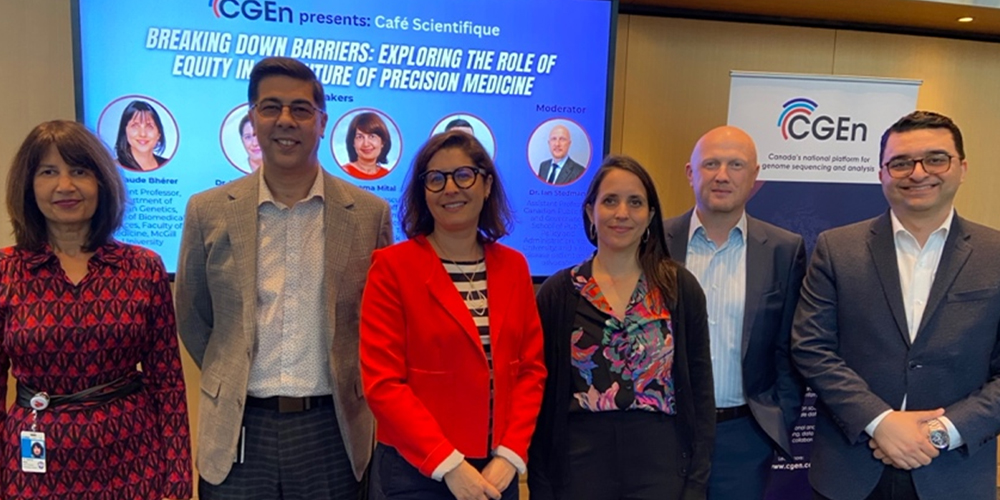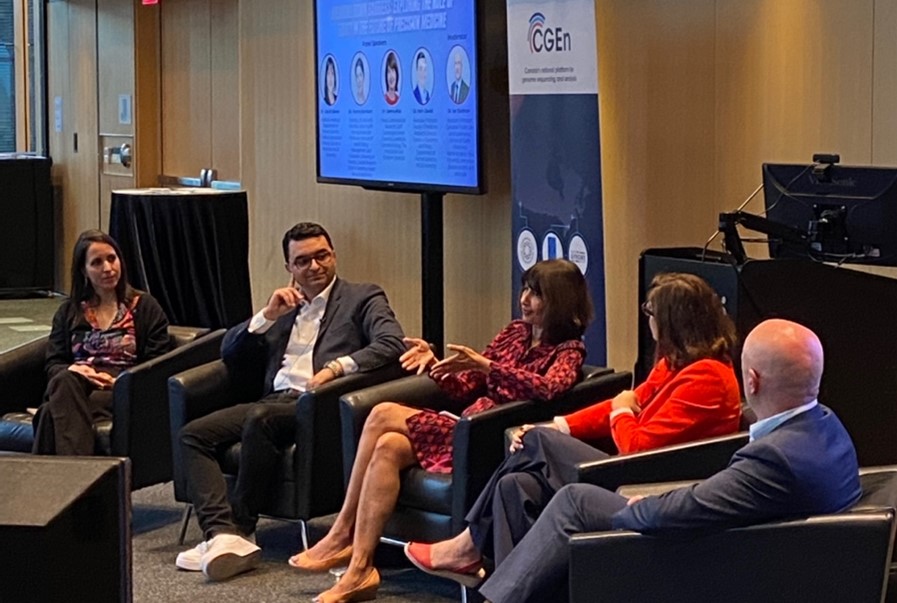CGEn Café Scientifique – Breaking down barriers: Exploring the role of equity in the future of precision medicine

CGEn, Canada’s national platform for genome sequencing and analysis, hosted its first Café Scientifique event on Monday, September 18, 2023, in Toronto and online. The event, supported by CIHR, aimed to foster an open dialogue between the general public and health research experts on health-related issues of public interest. The expert panel discussed the topic 'Breaking down barriers: Exploring the role of equity in the future of precision medicine'.
The panelists included:
- Dr. Claude Bhérer, Assistant Professor, Department of Human Genetics, School of Biomedical Sciences, Faculty of Medicine, McGill University
- Dr. Yvonne Bombard, Scientist, Li Ka Shing Knowledge Institute, St. Michael's Hospital, Unity Health Toronto; Associate Professor, Institute of Health Policy, Management and Evaluation, University of Toronto; Canada Research Chair in Genomics Health Services and Policy
- Dr. Seema Mital, Professor of Pediatrics, Head of Cardiovascular Research; Staff Cardiologist; Senior Scientist, Genetics & Genome Biology, The Hospital for Sick Children (SickKids)
- Dr. Ma'n Zawati, Associate Professor, Faculty of Medicine; Research Director, Centre of Genomics and Policy, Department of Human Genetics, McGill University
The panel was moderated by:
- Dr. Ian Stedman, Assistant Professor, Canadian Public Law and Governance, School of Public Policy and Administration, York University; and a rare disease patient and advocate.

The panelists described examples of their current and emerging research in precision/personalized medicine, their views on equity gaps and challenges, and ways to detect, monitor, and measure inequities in research and clinical care. They highlighted specific initiatives and what work is still required to move toward a more equitable future. Finally, they engaged in an open discussion with the audience, including health care providers, government members, patients and members of the public, on ways to overcome the barriers and equity challenges in precision medicine.
The full recording of the discussion can be listened to on CGEn’s Podcast:
Below are some of the key highlights from the expert panel:
Dr. Claude Bhérer
- Most genetic studies so far have been conducted in participants of European ancestries, yet these represent only a fraction of worldwide populations. As such, there is a clear disparity in genetic knowledge between European and non-European populations, which has been shown to impact the translation of genetic information to the clinic.
- Thus, advancing diversity in genetic studies is seen as a priority to advance equity in genetics and precision medicine.
- In Canada, there are flagship projects such as the Silent Genomes co-designed with Indigenous Peoples. Yet, there is a major gap in knowledge on which communities are involved in genomic research.
- My team, specialized in population genetics, is starting to study this question, and is developing new statistical methods to study the genetics of populations with diverse evolutionary histories.
Dr. Yvonne Bombard
- Research and clinical care are inextricably linked, such that opportunities to participate in innovative technologies are usually afforded to those who access health care/clinical genetics.
- Unfortunately, there are real structural inequities and racism that exist that have led to disparities in who can access health care and research.
- While there is over a decade of research on these issues in the United States, there is a dearth of evidence in Canada.
- My research focuses on improving access to genetics and developing interventions (e.g., digital platforms and patient/community engagement) to mitigate these disparities.
Dr. Seema Mital
- It is important to understand the unique characteristics of each individual in order to apply precision medicine approaches to their care. Our team is leveraging our provincial, national and international cohorts to study the genomic basis of heart disease and use that knowledge to personalize patient care. Biobanks are powerful since they allow us to capture geographically and racially diverse populations.
- We are implementing prediction algorithms that include multi-dimensional data as point of care tools that can be used to predict disease before it occurs and facilitate timely interventions to prevent it. Similarly, pharmacogenetic data are being used to guide choice of life-saving drugs in children with heart failure.
- An important step towards equitable dissemination of precision medicine is to remove barriers to national and international data sharing, and to address affordability of precision therapeutics.
Dr. Ma'n Zawati
- To achieve equitable access to genetic tests and services, policy barriers need to be addressed and overcome.
- One source of real-world evidence to inform practices (and eventually guidelines) is interoperable data systems, that allow efficient data-sharing.
- Unfortunately, some projects develop complicated (and unfair) data sharing and privacy practices that do not allow the creation of diverse datasets.
- My research focuses on good governance practices and the development of policies that allow for efficient, ethical and equitable use of data in precision medicine research projects.
- Date modified: